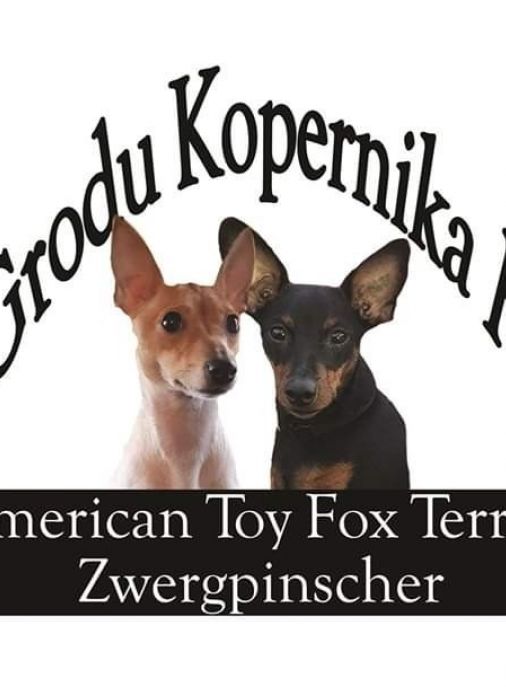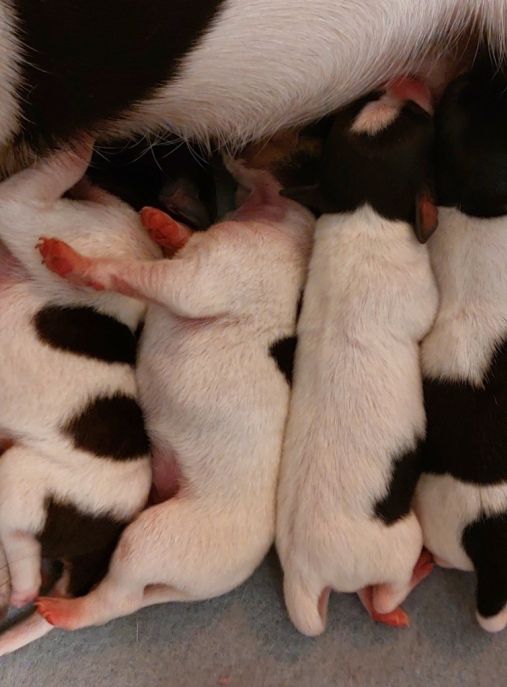American Toy Fox Terrier - to be published
The American Toy Fox Terrier is a small, energetic, and intelligent breed known for its lively personality and charming demeanor. With their compact size and keen intelligence, these dogs make excellent companions for individuals and families alike. Let's delve into the character of American Toy Fox Terriers, their behavior, and how to raise and train them.
In terms of character, Toy Fox Terriers are known for their bold and confident nature. They possess a strong sense of loyalty towards their owners and are always eager to please. These dogs are highly affectionate and thrive on human companionship, making them excellent lap dogs and family pets. Despite their small size, they are fearless and possess a natural curiosity, which can sometimes get them into trouble if not properly supervised.
When it comes to behavior, Toy Fox Terriers are energetic and playful. They have a boundless amount of energy and require regular exercise to keep them physically and mentally stimulated. Daily walks, playtime, and interactive toys are essential to prevent boredom and destructive behavior. Due to their high energy levels, they may not be the best fit for apartment living unless provided with ample exercise opportunities.
Socialization is crucial for Toy Fox Terriers from an early age. They tend to be wary of strangers and may exhibit protective behavior towards their family. Proper socialization helps them develop into well-rounded dogs who are comfortable in various situations and around different people and animals. Early exposure to different environments, sounds, and people will help them become more confident and less prone to anxiety or aggression.
Training a Toy Fox Terrier requires consistency, patience, and positive reinforcement techniques. These dogs are highly intelligent and eager to learn, making them relatively easy to train. However, they can be stubborn at times, so a firm and consistent approach is necessary. Early obedience training, including basic commands such as sit, stay, and come, is essential for their safety and well-being.
Due to their terrier heritage, Toy Fox Terriers have a strong prey drive and may exhibit chasing behavior towards small animals. It is crucial to supervise them around smaller pets and provide proper training to curb any potential aggression towards other animals. Additionally, crate training is recommended to prevent destructive behavior when left alone.
When raising a Toy Fox Terrier, it is important to establish clear boundaries and rules from the beginning. Consistency and positive reinforcement will help them understand what is expected of them. These dogs thrive on praise and rewards, so using treats, toys, and verbal praise during training sessions will motivate them to perform well.
In conclusion, the American Toy Fox Terrier is a lively, affectionate, and intelligent breed. They require regular exercise, socialization, and consistent training to thrive. With the right care and attention, these dogs make wonderful companions for individuals and families who are willing to provide them with the love, exercise, and mental stimulation they need.
The American Toy Fox Terrier is a small, energetic, and intelligent breed that requires proper care to ensure their overall well-being. Here are some tips on how to care for these delightful dogs, including what to do and what not to do:
1. Exercise: Toy Fox Terriers are active dogs that require regular exercise to burn off their energy. Daily walks, playtime, and interactive toys are essential to keep them physically and mentally stimulated. However, avoid overexertion, especially in extreme weather conditions, as they are prone to overheating.
2. Grooming: This breed has a short, smooth coat that is relatively low-maintenance. Regular brushing with a soft bristle brush will help keep their coat clean and healthy. Bathing should only be done when necessary to prevent drying out their skin. Additionally, remember to trim their nails regularly and clean their ears to prevent infections.
3. Training: Toy Fox Terriers are highly intelligent and eager to please, making them relatively easy to train. Start training early, using positive reinforcement techniques such as treats and praise. Consistency and patience are key, as they can be stubborn at times. Socialization is also crucial to prevent them from becoming overly protective or aggressive.
4. Health care: Regular veterinary check-ups are essential to ensure your Toy Fox Terrier's health. Vaccinations, flea and tick prevention, and heartworm medication should be administered as recommended by your vet. Dental care is also important, so consider regular teeth brushing or providing dental chews to maintain good oral hygiene.
5. Nutrition: Provide a balanced and nutritious diet suitable for small breeds. High-quality dog food with appropriate protein and fat content will help maintain their energy levels and overall health. Avoid overfeeding, as Toy Fox Terriers are prone to obesity. Consult your vet for specific dietary recommendations based on your dog's age, weight, and activity level.
6. Mental stimulation: These intelligent dogs thrive on mental stimulation. Engage them with puzzle toys, interactive games, and obedience training sessions to keep their minds sharp. Lack of mental stimulation can lead to boredom and destructive behavior.
7. Safety precautions: Toy Fox Terriers are curious and adventurous, so it's important to ensure their safety. Secure your yard with a fence to prevent them from wandering off. Keep toxic substances, small objects, and electrical cords out of their reach. Supervise them around larger dogs or young children to prevent any potential accidents.
What not to do:
1. Do not leave your Toy Fox Terrier alone for extended periods. They are social dogs and can become anxious or develop separation anxiety if left alone for too long.
2. Avoid harsh training methods or punishment-based techniques. These can lead to fear or aggression in this sensitive breed. Instead, focus on positive reinforcement and reward-based training.
3. Do not overfeed your Toy Fox Terrier. Obesity can lead to various health issues, including joint problems and heart disease. Follow feeding guidelines and consult your vet for portion control.
4. Avoid excessive exercise in extreme weather conditions. Toy Fox Terriers are susceptible to heatstroke, so be cautious during hot weather and provide plenty of water and shade.
By following these care tips and providing a loving and stimulating environment, you can ensure that your American Toy Fox Terrier remains happy, healthy, and well-adjusted.
The American Toy Fox Terrier is a delightful breed known for its small size and lively personality. When it comes to their coat color, these dogs exhibit a range of possibilities, but there is one common color that is often associated with this breed.
The most prevalent color seen in American Toy Fox Terriers is white. A majority of these dogs have a predominantly white coat, which serves as a canvas for other markings and patterns. The white coloration is typically crisp and pure, giving these dogs a clean and elegant appearance.
While white is the base color, it is often accompanied by patches or spots of other colors. One of the most common secondary colors seen in Toy Fox Terriers is black. Black markings can be found on the head, ears, back, or tail, creating a striking contrast against the white background. These black markings can vary in size and shape, ranging from small dots to larger patches.
In addition to black, American Toy Fox Terriers can also have tan or brown markings. These markings are usually seen on the face, eyebrows, cheeks, legs, and sometimes on the chest. The tan or brown coloration adds warmth and depth to the overall appearance of the dog, complementing the white and black elements.
It is worth noting that some Toy Fox Terriers may have a combination of all three colors - white, black, and tan/brown. This tri-color pattern is often seen in a specific distribution known as "piebald." Piebald Toy Fox Terriers have a predominantly white coat with large patches of black and tan/brown scattered throughout their body. This unique coloration gives them a distinctive and eye-catching look.
The coat of an American Toy Fox Terrier is typically short and smooth, which enhances the visibility of their color patterns. This low-maintenance coat is easy to groom and requires minimal attention to keep it looking its best.
While white is the most common color in American Toy Fox Terriers, it is important to note that there can be variations within the breed. Some individuals may have different color combinations or patterns, such as predominantly black or predominantly tan/brown coats. However, the white base color remains a defining characteristic of this breed.
In conclusion, the common color of American Toy Fox Terrier dogs is white, often accompanied by black and tan/brown markings. This combination of colors creates a visually appealing coat that highlights the breed's elegance and charm. Whether they have small black spots or large piebald patches, these dogs are sure to capture attention with their unique and beautiful coloration.
The American Toy Fox Terrier is a small, energetic, and intelligent breed known for its playful nature and loyal disposition. While generally a healthy breed, Toy Fox Terriers, like any other dog breed, are prone to certain health issues. Understanding these common diseases and taking appropriate care can help ensure the overall well-being of these delightful dogs.
One of the most prevalent health concerns in Toy Fox Terriers is patellar luxation. This condition occurs when the kneecap slips out of its normal position, causing discomfort and lameness. Regular exercise and maintaining a healthy weight can help prevent this condition. Additionally, regular veterinary check-ups are essential to identify any early signs of patellar luxation and provide appropriate treatment.
Another common health issue in Toy Fox Terriers is dental problems. Due to their small size, these dogs are prone to dental overcrowding, gum disease, and tooth decay. Regular dental care, including brushing their teeth, providing dental chews, and scheduling professional cleanings, is crucial to maintain good oral health.
Hypothyroidism is also seen in Toy Fox Terriers. This condition occurs when the thyroid gland does not produce enough hormones, leading to weight gain, lethargy, and skin problems. Regular blood tests can help diagnose and manage this condition, and lifelong medication is often required to regulate hormone levels.
Like many small breeds, Toy Fox Terriers are susceptible to allergies. These allergies can be triggered by various factors, including food, environmental allergens, or even certain grooming products. Identifying and eliminating the allergen is essential to alleviate symptoms such as itching, redness, and skin infections. Consultation with a veterinarian can help determine the cause of allergies and develop an appropriate treatment plan.
Additionally, Toy Fox Terriers may be prone to Legg-Calve-Perthes disease, a condition that affects the hip joint. This disease causes the femoral head to deteriorate, leading to pain and lameness. Surgical intervention is often necessary to alleviate discomfort and improve mobility.
To care for the health of American Toy Fox Terriers, regular exercise is crucial. These energetic dogs require daily walks, playtime, and mental stimulation to prevent obesity and maintain their overall well-being. A balanced diet, appropriate for their age and activity level, is also essential to provide necessary nutrients and maintain a healthy weight.
Regular veterinary check-ups are vital to detect any potential health issues early on. Vaccinations, parasite prevention, and routine screenings should be a part of their healthcare regimen. Additionally, maintaining good dental hygiene by brushing their teeth regularly and providing appropriate chew toys can help prevent dental problems.
Socialization is equally important for Toy Fox Terriers. Exposing them to various environments, people, and other animals from a young age can help prevent behavioral issues and ensure they grow up to be well-adjusted companions.
In conclusion, while American Toy Fox Terriers are generally healthy dogs, they can be prone to certain health issues. Being aware of these common diseases and taking proactive measures, such as regular veterinary care, proper nutrition, exercise, and socialization, can help ensure the long and healthy life of these delightful dogs.
The American Toy Fox Terrier is a small, energetic, and intelligent breed that requires a well-balanced and nutritious diet to maintain optimal health and vitality. Proper nutrition plays a crucial role in their overall well-being, including their growth, development, and immune system.
When it comes to feeding an American Toy Fox Terrier, it is important to choose high-quality dog food that meets their specific nutritional needs. Look for a dog food that is specifically formulated for small breeds, as they have different requirements compared to larger dogs. The food should contain a good balance of protein, carbohydrates, fats, vitamins, and minerals.
Protein is an essential component of a Toy Fox Terrier's diet as it helps in muscle development and repair. Look for dog food that lists a high-quality source of animal protein, such as chicken, turkey, or fish, as the first ingredient. Avoid dog foods that contain excessive amounts of fillers or meat by-products.
Carbohydrates provide energy for your Toy Fox Terrier, but it is important to choose complex carbohydrates that are easily digestible. Look for dog food that includes whole grains like brown rice or oats, as they provide a steady release of energy. Avoid dog foods that contain excessive amounts of corn, wheat, or soy, as these can cause allergies or digestive issues in some dogs.
Fats are an important source of energy and help in the absorption of fat-soluble vitamins. Look for dog food that includes healthy fats like chicken fat or fish oil. These fats also contribute to a healthy skin and coat. Avoid dog foods that contain excessive amounts of saturated or trans fats, as they can lead to obesity and other health issues.
Vitamins and minerals are essential for the overall health and well-being of your Toy Fox Terrier. Look for dog food that includes a wide range of vitamins and minerals, such as vitamin A, vitamin D, vitamin E, and calcium. These nutrients support proper growth, bone health, and immune function. Avoid dog foods that contain artificial additives or preservatives, as they can be harmful to your dog's health.
In addition to choosing the right dog food, it is important to feed your American Toy Fox Terrier the appropriate portion sizes. Toy breeds have smaller stomachs, so they require smaller meals throughout the day. Divide their daily food intake into two or three meals to prevent overeating and digestive issues.
It is also important to provide your Toy Fox Terrier with fresh water at all times. Hydration is crucial for their overall health and helps in digestion and nutrient absorption.
While it is tempting to share human food with your Toy Fox Terrier, it is important to avoid certain foods that can be toxic or harmful to dogs. Some common foods to avoid include chocolate, caffeine, grapes, raisins, onions, garlic, and anything containing xylitol.
Lastly, regular exercise is essential for the overall health and well-being of your American Toy Fox Terrier. Along with a nutritious diet, daily exercise helps in maintaining a healthy weight, mental stimulation, and preventing behavioral issues.
Remember, every dog is unique, and their nutritional needs may vary. It is always a good idea to consult with your veterinarian to ensure you are providing the best possible nutrition for your American Toy Fox Terrier.








